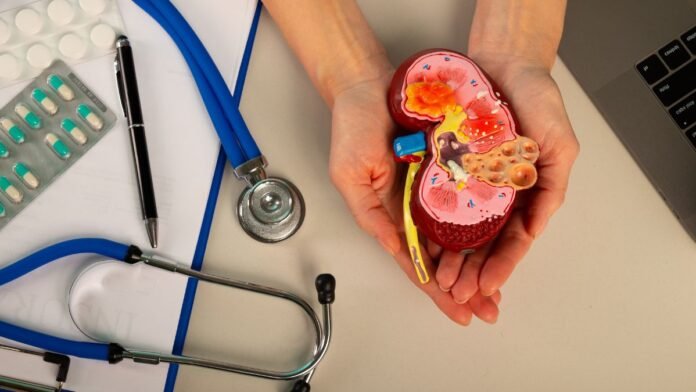Beverages such as soda and pain relievers should not replace water intake, and lifestyle mistakes like this one must be avoided to decrease the risk of kidney cancer. Here are a few lifestyle errors you must avoid to protect your kidney health.
Kidney cancer often develops silently within your cells without showing any noticeable symptoms, with risk increasing with age and lifestyle factors having a large influence on its progression. Nearly 4,600 people were diagnosed with kidney cancer in 2023 with an average age at diagnosis being 65.
Smokers have double the risk of kidney cancer compared to people who don’t smoke, although even non-smokers with poor lifestyle choices like eating unhealthy and staying inactive are susceptible to it as they get older. RCC accounts for 90% of kidney cancer cases worldwide.
Kidneys are vital organs that filter waste products and excess fluids out of your blood, maintain electrolyte balance, and regulate blood pressure. Unfortunately, kidney health can be affected by various lifestyle decisions or medical conditions that impede its proper function. One such danger is kidney cancer, an incurable condition marked by abnormal cell growth in the kidneys. Although kidney cancer may not display obvious symptoms early on, if left untreated it can quickly progress and pose significant health risks to its victim. “Fortunately, there are steps you can take to promote kidney health and lower the risk of kidney cancer and its related complications,” according to Dr Raghunath S.K, Senior Consultant and Director of Uro-oncology and Robotic Surgery at HCG Cancer Centre KR Road Bangalore.
Kidney cancer is linked with smoking, obesity and genetic predisposition; symptoms may include blood in urine, back pain, weight loss and fatigue. Diagnosis often requires imaging tests; treatment options available to you could include surgery, targeted therapy immunotherapy clinical trials tailored specifically for your stage of cancer and health status.” – says Dr Raghunath
Early detection is key to improving prognosis and there are steps one should take to lower the risk of kidney cancer.
Lifestyle Mistakes to Prevent Kidney Cancer
Here are the lifestyle mistakes you must avoid to protect your kidneys against cancer as recommended by Dr Raghunath SK:
- Not Eating A Balanced Diet: Focus on eating foods rich in fruits, vegetables and whole grains while cutting back on processed meats, sugary beverages and unhealthy fats to support optimal kidney health and decrease the risk of cancer. Nutrient-rich foods provide essential vitamins, minerals and antioxidants which support proper kidney functioning while decreasing cancer risks.
- Excess Weight: To stay healthy and maintain an ideal body weight through regular exercise and mindful eating habits. Excess weight can strain kidneys and increase the risk of disease and cancer. Focusing on eating nutritious food in appropriate portions to support weight management as well as overall wellness can be key.
- Not drinking enough water: Proper hydration is key to optimal kidney health and to eliminating waste products and toxins from your body. Aim for at least 8 glasses (2 litres) daily to support optimal kidney health; monitor your urine colour for signs that you’ve received adequate hydration; pale yellow is indicative of adequate hydration levels.
- Smoking and Alcohol Consumption: Both smoking and excessive alcohol consumption can increase your risk of kidney cancer, so quitting or moderating alcohol intake will protect your kidneys and lower the risk. Seek assistance from healthcare professionals or support groups if needed when trying to quit or reduce intake.
- Failing to Maintain Balanced Blood Pressure: Long-term high blood pressure exposure can damage kidneys, increasing your risk for both disease and cancer. Be sure to monitor and keep it within healthy levels by making lifestyle modifications such as eating healthily, engaging in regular physical activity, managing stress effectively and taking necessary medications if needed – consult your healthcare provider for personalized guidance in this matter.
- High Blood Sugar Levels: Diabetics have an increased risk of kidney disease and cancer, so tight control over their blood sugar levels through diet, exercise, medication and regular monitoring is critical to their well-being. Monitor carb intake regularly while engaging in physical activity to reduce kidney complications as part of a diabetes management plan to lower risks associated with kidney diseases.
- Overusing OTC Pain Relievers: Overusing OTC pain relievers may put a strain on your kidneys. Nonsteroidal anti-inflammatory drugs (NSAIDs), in particular, should only be taken when directed by healthcare professionals and in moderation; other pain management strategies include physical therapy, heat therapy or acupuncture as possible alternatives. Always adhere to recommended dosage instructions and refrain from long-term use without medical supervision.
Individuals can take proactive measures towards protecting their kidneys and maintaining optimal health by incorporating simple yet effective strategies into daily routines.



